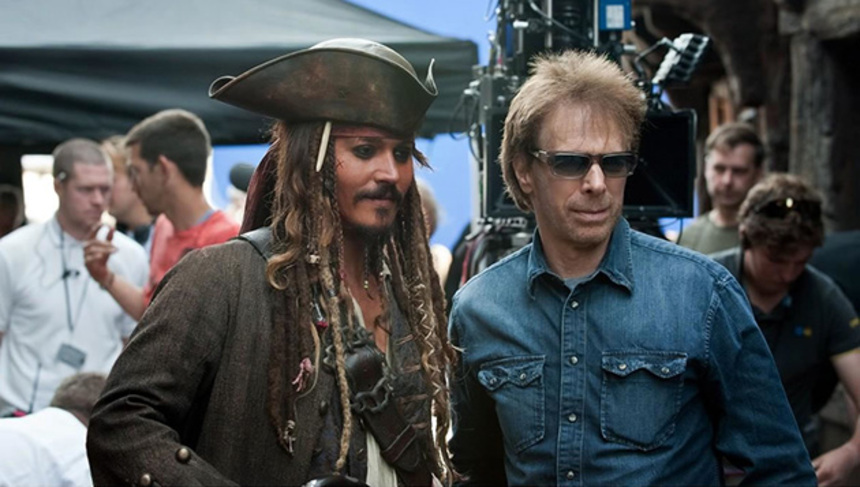Destroy All Monsters: Mega-Franchises And The Death Of The Producer, Starring Jerry Bruckheimer

I don't know that it came as any enormous surprise to see Jerry Bruckheimer and Disney part ways from their longstanding first-look deal last week; in addition to producing the Mouse House's year-defining bomb (The Lone Ranger), a disaster so disastrous it made John Carter look like a financial (if not creative) success, Bruckheimer's tempo has noticeably slowed of late. Since 2010, he's produced just two motion pictures for the company - Pirates of the Caribbean 4 and the aforementioned Ranger - after a decade with the company that saw him turning out a franchise wannabe every year, or multiple times per year.
Not for nothing, Bruckheimer's track record moved towards "spotty" a long time ago. The Pirates franchise defined the live action blockbuster model for Disney for the first decade of the 21st century, but many of Bruckheimer's other efforts at setting up new tentpoles - Prince of Persia, The Sorcerer's Apprentice - were lackluster. Franchise filmmaking is, at best, a dice game, so in this Bruckheimer can't be harshly criticized. He's doing the job he's paid to do. The industry around him, however, is moving away from the model.
One could argue that "franchise creation" has been the holy grail of Hollywood's big-budget model for at least the past twenty years. The industry emerged from the '80s with the lessons taught by movies like Star Wars, Rocky and Indiana Jones, about popcorn-driving cross-quadrant fare that could be iterated into repeat business by a lather/rinse/repeat model.
This model gave us four Batman movies in eight years, one of the American film industry's best examples of a studio wringing a successful teat so completely dry that it pretty much ripped the teat clean off ("The Ice Man cometh!"). And it's a model that has pretty much kept the industry in good stead ever since, fueled (increasingly) by comic books and fantasy novels that have allowed the filmmakers to conduct the movie business equivalent of condominium pre-sales: you were already bought in; all you had to do was wait for them to build it. (And yes, some of them didn't pass home inspection - but you were already bought in!)
I'd argue that since the release of Iron Man in 2008, however, we've been witnessing the construction of an even larger model, above simple franchising. I've called it the mega-franchise model, because it can be seen in studios' efforts to set up multiple, parallel franchises that all theoretically feed into and attract the same mega-audience (the Marvel Cinematic Universe; the new Star Wars alternating episode / origin story cadence; whatever the hell DC is doing with Superman, Batman and the Justice League).
But one could just as easily describe it by saying that Hollywood is now graduating from a franchise model to an outright brand model, where the roman numerals that used to let you know that you were witnessing the next train car in a comfortably uniform whole train (Spider-Man 1, 2, 3, and Amazing) have been replaced by gargantuan cross-narrative "Whole Universe" models composed not just of multiple movies, books, video games, and other tie-ins, but multiple multiple movies, books, video games, and everything else - a somewhat comforting, somewhat unnerving perspective that holds that everything is connected; that Episodes VII, VIII and IX will be enjoyable enough on their own, but throw in Origin: Yoda, Origin: Boba Fett and Star Wars: Rebels, and all of their ancillary books, video games, and tie-ins, and you've really got something. Tolkienian density, writ large, and available at subscription price.
And so, the seat of power in Hollywood must, simply, cease to be the producer. Producers produce films. Presidents create brands, and if you want a good distinction between the two, look no further than Kathleen Kennedy, who used to be one, and has become the other. I've no doubt that Kennedy will bring much of her producerial experience to bear on navigating the next iteration of the Star Wars mega-franchise through its first decade, but she will be doing so from a higher level than any that Bruckheimer has ever worked at.
Kennedy (whose studio is housed, by no coincidence I think, at Disney - Bruckheimer's former home) is, like Kevin Feige (President of production at Marvel Studios, also at Disney), a prototype of the next version of the Hollywood power player. Their umbrella corporation, Disney, is the studio striding most confidently into the mega-franchise landscape. They have Pixar, Lucasfilm, and Marvel, and with all that going on, have no need of smaller, independent pieces like the Pirates of the Caribbean franchise, or anything similar that a Jerry Bruckheimer type could bring to them on a first-look basis. Franchise building does, still, require some element of risk, as The Lone Ranger adeptly proved. Brands, once accepted, tend to continue to be accepted. Even the Star Wars prequels have done nothing to dim the collective interest pointed at Episode VII right now... and if you can weather that brand shitstorm, you can probably do pretty much anything.
Disney has its brands, and doesn't really need anything as quaint as "movies" any more. The studio is a mega-conglomerate selling off its smaller, less useful portfolios - and Jerry Bruckheimer is only the most visible recent example.
Destroy All Monsters is a weekly column on Hollywood and pop culture.







